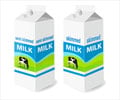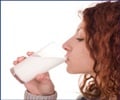A new study shows that a probiotic formula given to infants with cow’s milk allergy changes the composition of their gut bacteria to help them develop tolerance to the food.

Previous research has shown that infants with the allergy who are fed formula containing a form of the milk protein casein, supplemented with the probiotic bacterial species Lactobacillus rhamnosus GG (LGG), develop a better tolerance.
"Mouse model work from our laboratory published last year identified a common class of mucus-associated gut bacteria that play a critical role in regulating the access of dietary allergens to the bloodstream. This suggests a novel mechanism by which commensal bacteria regulate allergic responses to food," said lead author Cathryn Nagler, professor at the University of Chicago.
Researchers examined whether probiotic administration changes gut bacterial composition to improve acquisition of tolerance to cow's milk.
The investigators carried out an analysis to recognize bacteria in stool samples collected from healthy infant subjects, infants with cow's milk allergy who had been fed the LGG enriched probiotic formula, and those who had been fed the formula without added probiotics.
Results showed that infants treated with the LGG probiotic formula who developed tolerance to cow's milk also had higher levels of bacteria that produce butyrate than those who were fed the probiotic formula but did not develop tolerance.
Advertisement
Advertisement















